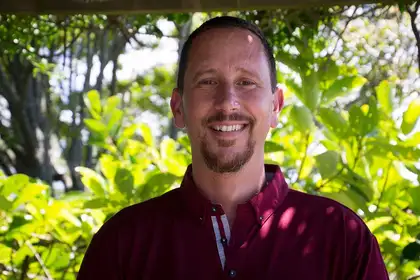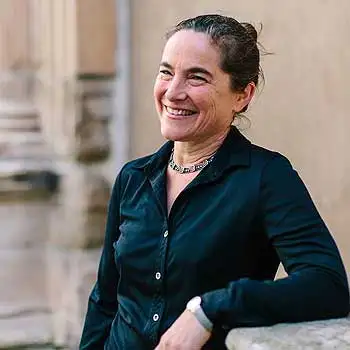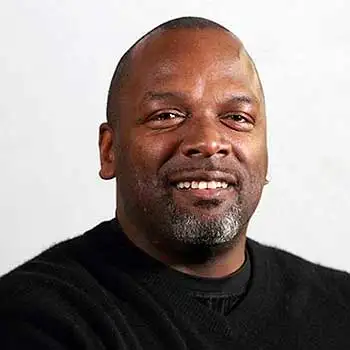
Theatre studies lecturer Dr Rand Hazou, organiser of the Performing Arts and Justice Symposium.
A symposium exploring the power of theatre, music and other art forms to humanise our prisons and help reduce rising imprisonment rates, brings together local and international academics, former prisoners and arts activists at Massey University this week.
The Performing Arts and Justice Symposium, hosted at Massey’s Auckland campus on September 5 and 6, is a joint project by Massey, Auckland University and Griffith University, Queensland, Australia.
Organiser Dr Rand Hazou from the School of English and Media Studies teaches theatre studies at Massey in Albany and has worked on several theatre projects at Auckland Prison, Paremoremo. He says that while theatre and creative arts programmes exist in criminal justice in Aotearoa, “there has been limited academic attention given to their impacts and implications.”
The symposium will, he says, “attempt to explore the role of theatre and the creative arts in decolonising and transforming the corrections system in New Zealand.”

Dr Amie Dowling.
He says there is a strong international body of literature documenting the positive impacts of theatre and creative arts programmes in criminal justice settings. “International evidence shows that prisoners who take part in arts programmes are less likely to end up back in prison, and that such programmes reduce the number of disciplinary breaches within correctional centres.”

Dr Reginold Daniels.
Government signals support for more arts in prisons
Dr Hazou says he is heartened by the recent Hōkai Rangi Strategy released by the Department of Corrections, and which aims to cut the number of Māori in prison from 52 per cent down to 16 per cent to match the overall Māori population, and by 10 per cent over the next five years. Dr Hazou says the strategy explicitly states that: “Access to culture is a fundamental right, not a privilege.”
“Given the strategy’s focus – how do we ensure access to arts and culture is a right enjoyed by prisoners across the criminal justice system? How do we shift the discussion about the importance of the arts as a fundamental right within criminal justice?”
The impetus for the symposium is a widening concern that New Zealand’s prison population is one of the highest in the OECD, at around 220 people per 100,000, and rising, compared to an OECD average of 147 per 100,000. According to the Department of Corrections, in March 2018 New Zealand’s prison population reached an all-time high of 10,700. Māori constitute more than half the prison population, despite being only 15 per cent of the overall population. “The over-representation of Māori in corrections has been linked to the ongoing impacts of the legacy of colonialism,” Dr Hazou says.
Keynote speakers:
- Former prison inmate and now adjunct professor at the University of San Francisco, Dr Reginold Daniels, who has spearheaded prison theatre performances and workshops in the United States and Germany
- Māori lawyer Dr Moana Jackson, Ngāti Kahungunu and Ngāti Porou, who is currently the lead researcher on He Whaipaanga Hou – a large-scale research project on the criminal justice system and its impact on Māori. Professor Michael Balfour (University of New South Wales, Sydney) will present on a recent Australian Research Council project, Captive Audiences, focused on five Australian case studies that used the performing arts in corrections in diverse ways.
- Dr Amie Dowling (University of San Francisco), an associate professor in performing arts, will share a platform with Dr Daniels. For the past 18 years, her work has considered the politics and representation of mass incarceration, and for the past 12 years she has facilitated performance workshops in the San Francisco jails and is currently a member of the Artistic Ensemble at San Quentin Prison.
- Dr Dowling and Dr Daniels will be offering two theatre workshops next week at Paremoremo Prison as part of a partnership between Auckland Prison and Massey University. The workshops will employ discussion, movement, physical theatre, and writing to stimulate the participants’ imaginations and creative thinking to explore the power of personal story and experience.
- Dr Sarah Woodland and Dr Vicki Saunders (Griffith University) will discuss their work with Indigenous Aboriginal women in prison using sound recordings from the natural environment.
- Professor Brenda Morrison, director of the Centre for Restorative Justice, (Simon Fraser University, Canada), will share indigenous justice and reconciliation initiatives from Canada, and ground-breaking New Zealand theatre group The Conch will discuss their theatre productions, which have toured nationally in theatres, festivals and prisons, as a force for social change by “telling stories that need to be told.”
For more information on the symposium click here.